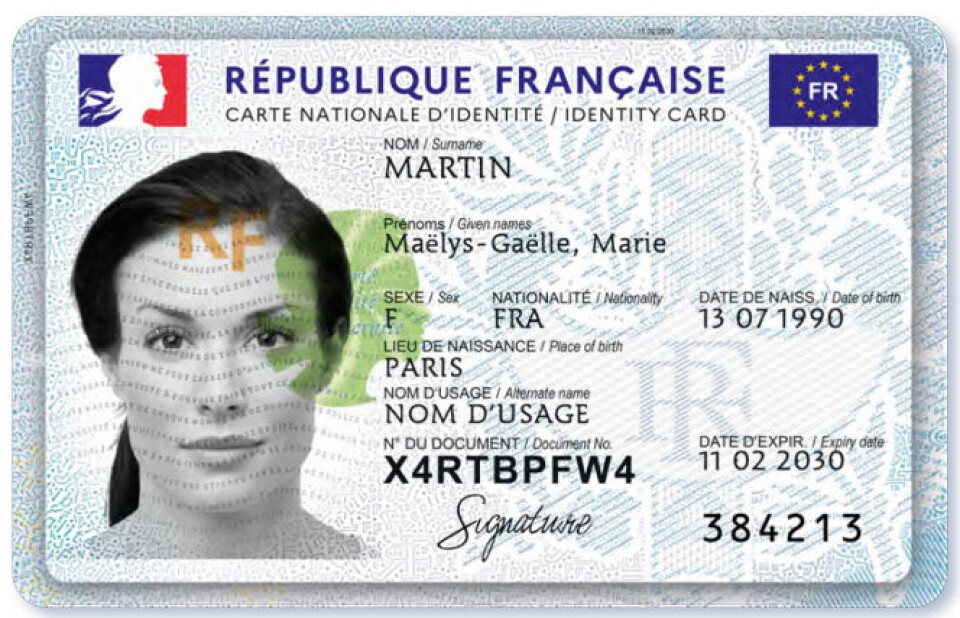-
Low-cost French airline launches Paris - Montréal route
Daily flights are scheduled between the two cities this summer
-
French woman named one of world’s best teachers
Céline Haller, inspired by English and US teaching methods, has gained recognition for revolutionising learning with hands-on projects and inclusivity
-
Older British bikers can regain driving licence 'A' category in France
Some Britons lost this when swapping their UK for a French licence
Académie Française opposes new French identity card as it uses English
The traditional custodians of the French language have asked the prime minister to suspend the card and say they will take the issue to court if no action is taken

The Académie Française has called for the new French biometric identity card to be suspended saying the addition of English translations of French expressions on the card is unconstitutional.
For the first time in its almost 400-year history it has also threatened court action if nothing is done, as opposed to its usual method of putting out statements of its views, which it traditionally expected to be listened to.
Hélène Carrère d’Encausse, perpetual secretary of the Académie told Le Figaro: “Today everyone’s comments are just treated equally, so a different approach was required.”
The card was introduced on August 2, 2021 and immediately upset Académie members.
The Académie, one of the country's most hallowed institutions and charged with defending and helping to define the French language, says it will appeal to France’s highest administrative court, the Conseil d’Etat, if Prime Minister Jean Castex does not act.
The decision reflects a long tradition of the Académie fighting the invasiveness of the English language within the French language.

The Académie is specifically asking for the removal of several English translations on the new carte nationale d’identité (translated as ‘identity card’), such as surname, given names,place of birth, alternate name and expiry date (the back of the card includes others, such as taille/height and date de délivrance/date of issue).
No other languages, apart from French, feature on the cards.
We note that French passports contain similar translations (and UK ones contain French ones), however the Académie appears to be upset that a specficially 'national' card (not primarily intended for travel) is being translated for the first time, and at the French government's initiative.
The Académie bases its case on article 2 of the Constitution which states: “The Language of the French Republic is French”. It would also violate a 1994-bill requiring administrative documents to be written in French, it claims.
“Finally, by choosing English as the only language of translation, the authors of the project have forgotten the desire of the public authorities – supported by public opinion – to preserve the French language from the invasion of foreign terms, which are particularly English words, when they are not useful”, said Ms Carrère d’Encausse and Académie member Frédéric Vitoux, in an op-ed for Le Figaro.
The Connexion has contacted Ms Carrère d'Encausse’s secretary and is awaiting a response.
The prime minister has under two months to satisfy the Académie’s demand before it appeals to the Conseil d’Etat. If the Conseil d’Etat favours the Académie, the government will have to cancel a decree maintaining the identity card’s current form.
Ms Carrère d’Encausse and Mr Vitoux had already voiced their anger about France’s decision to translate several words to their English equivalents, arguing that it is not in line with an EU regulation which asks that the term carte d’identité – and only this term – be translated by another official language of the EU.
While the UK left the European Union with Brexit, English is still recognised as one of its 24 official languages, as Ireland and Malta have English as official languages.
The decision to add the translations to the new card was said by the French government to facilitate travel (we note that ID cards may be used for this purpose within the EU), however the Académie’s complaints were supported by several prominent intellectual figures, including French philosopher Barbara Cassin or politicians.
Read more: Why are France’s new identity cards translated into English?
“Little by little, the ‘Globish’ steamroller is imposing itself with the complicity of the French government, even in our identity papers,” said French senator Mickaël Vallet, referring to a term of French origin to describe a simplified version of English used by non-native speakers around the world.
Several European states, such as Poland, have also translated words on their identity cards. Spain has translated its title while Germany chose three translations, using German, English and French.
Read more
Le Petit Robert sparks debate by adding neutral pronoun to dictionary
Joining a library in France: A free way to improve your French
























